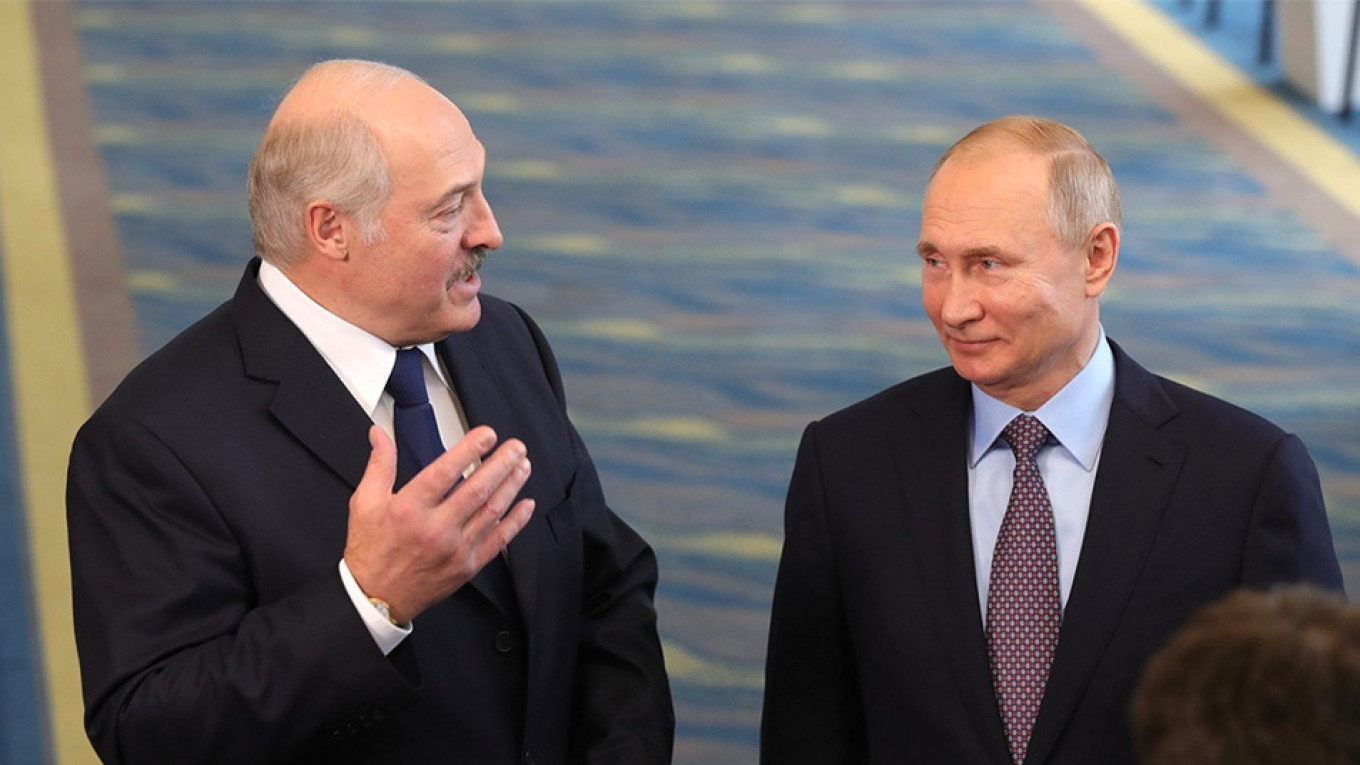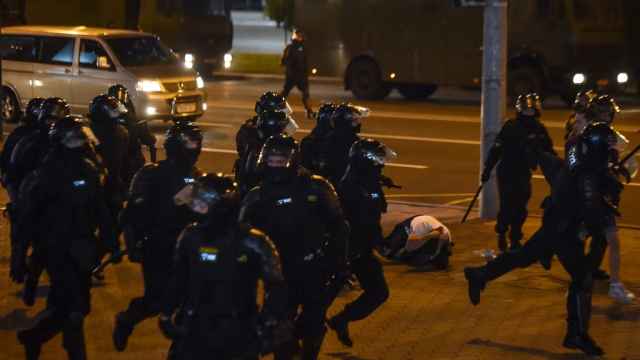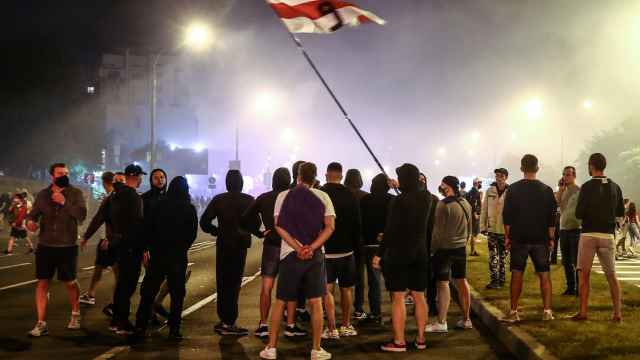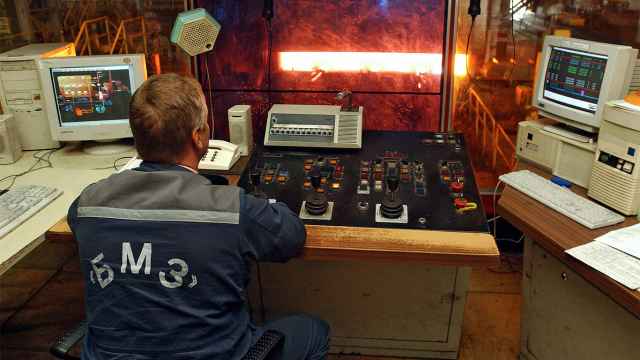Putin Doesn’t Want to Intervene in Belarus. That’s an Opportunity for the West.
It’s certainly not too soon for Moscow and Brussels to learn from past mistakes.
By Anna Arutunyan

Alexander Lukashenko and Vladimir Putin Kremlin.ru
In the spring of 2006, I was dispatched as a reporter for The Moscow News to cover the presidential elections in Belarus — and the mounting protests against the incumbent Alexander Lukashenko.
The demonstrations came on the heels of two pro-Western color revolutions in Ukraine and Georgia the previous year, and there was a great deal of naive hope, particularly in the West, that popular demonstrations could easily and bloodlessly topple a dictator.
I was pessimistic, and after I filed my dispatch, titled “Belarus: Too Soon for ‘Blue’ Revolution,” my skepticism was vindicated.
The protests were brutally suppressed, there was global and domestic condemnation, but Lukashenko’s regime survived.
Now, the time has come, largely through Lukashenko’s own undoing, but also, in part, thanks to a perfect storm of the pandemic, a stagnating economy, and Moscow’s growing weariness with subsidizing Belarus and playing cat and mouse with an ally turned frenemy.
Lukashenko may well succeed in suppressing these protests through demonstrative terror, but even if he wins this gamble, he will at best buy a couple of years of hollow, illegitimate rule before his administration finally implodes.
These elections weren’t just rigged — all autocrats do that. The results appear to have been flipped in his favor to mask an irredeemable defeat.
And the spectacular, punitive mass torture that his OMON forces instigated to cow not just protesters but ordinary people into submission wipes away the last traces of legitimate power in the eyes of the very people who once obeyed him. One does not just walk away from such abuses.
But far from the wide-eyed optimism and hope that accompanied protests in 2006, the prospect of Lukashenko’s demise poses a headache both for the Kremlin and for Minsk’s Western neighbors.
Doing nothing feels uncomfortable, but doing something is rife with consequences. In the last decade, “constructive intervention” and even moral support to help send a dictator who has outstayed his welcome on his way have devolved into bloody proxy wars in Libya, Syria and Ukraine. Western and EU support of the Euromaidan protests to topple Viktor Yanukovich triggered a military intervention from Moscow and a war that simmers to this day.
NEWS
Belarus Leader Vows to Hold Fast as Tens of Thousands March for New VoteREAD MORE
This is not a likely scenario for Belarus, but there is some risk of escalation.
Initially, Moscow was careful about overtly backing Lukashenko in word or deed. Russian media reported openly on police abuses, and prominent statesmen publicly called on Russia to abandon Lukashenko. But over the weekend, thanks to a request from Lukashenko, Moscow appears to have caved and promised, “if necessary,” to support its frenemy under the Collective Security Treaty Organization (CSTO), the collective defense pact for former Soviet countries.
This is still a far cry from the rhetoric and action that preceded Moscow’s military intervention in Ukraine, when Russian officials and pundits called Maidan protesters anti-Russian “fascists” and their new government a “junta” and threatened to send thousands of “volunteers.” But it raises the risk of competitive intervention.
Until now, the protests were geopolitically neutral and thus posed no threat to Russia. There were no calls to join the EU or NATO and thus no real pretext for Moscow to care.
But now, Moscow’s pledge of support for Lukashenko and its growing accusations of Western intervention risk turning the demonstrators against Russia and triggering increasing support from European states — and, especially, Washington. This sort of competition could polarize the demonstrations — further endangering Belarusian protesters.
But Moscow’s pledge to support the regime also smacks of reluctance. Initially, words to the effect that Moscow would provide security came from Lukashenko, not from the Kremlin, whose initial statement, however conciliatory, mentioned nothing of aid or support.
NEWS
Russian Media Responds to Belarus Protest CrackdownREAD MORE
It took a second conversation on Sunday for Moscow to explicitly mention its obligations under the CSTO. And even so, technically, mentioning CSTO is merely reminding the world of Russia’s obligations under an existing treaty, not pledging new ones.
There are a lot of reasons for Moscow’s hesitation.
Lukashenko was once a useful and reliable ally to Moscow because of his commitment to the Union State — a shared space with Moscow that would eventually integrate not just customs, but the government institutions of the two Slavic countries.
But the last year — and the last month in particular — have demonstrated that he is no longer a figure Moscow can trust.
After Russia started reducing discounts on crude oil it sold to Belarus in 2018, relations began to sour. Moscow, tired of giving something for nothing, proposed that Lukashenko move faster on Union State integration if he wanted oil discounts. Lukashenko, understandably, painted this as interference in Belarusian sovereignty, expelled a Russian diplomat, and flirted with the West.
Then last month, Belarus arrested mercenaries it alleged Moscow had sent to destabilize the country ahead of the elections — a snub the Kremlin is unlikely to forget, given that it mentioned the incident in its recent statement on Lukashenko’s cry for help to Putin. It is a dangerous business, offering security and support to a regime that has repeatedly accused you of violating its sovereignty.
So, what are Putin’s options? They are limited.
The first is throwing his force behind Lukashenko. But Moscow doesn’t want to stage another aggressive intervention. Contrary to some Western takes about Moscow’s appetite for annexation, it is smarting from the debacle of Donbass, where it is still “cleaning up the mess,” as a former Kremlin official once told me, created by its own separatist proxies that it armed and financed.
But it would feel itself forced to in the event of real or perceived Western “meddling.”
Remember, Russian security culture holds a very paranoid view of geopolitics. A short statement of solidarity for protesters from a European government can easily transform, in the eyes of Russia’s Security Council, into a coordinated campaign with political, financial and military support. There were already grumblings last week among Russia’s pro-Kremlin experts that Polish and Lithuanian NGOs are “interfering” in Belarus’ domestic affairs.
In the last few days, these accusations have become official. Moscow is still highly unlikely to intervene militarily on Lukashenko’s side, but if it were to do so, it would be in response to a perceived existential threat, not out of a desire to annex a country or back an autocrat.
In the spring of 2006, I was dispatched as a reporter for The Moscow News to cover the presidential elections in Belarus — and the mounting protests against the incumbent Alexander Lukashenko.
The demonstrations came on the heels of two pro-Western color revolutions in Ukraine and Georgia the previous year, and there was a great deal of naive hope, particularly in the West, that popular demonstrations could easily and bloodlessly topple a dictator.
I was pessimistic, and after I filed my dispatch, titled “Belarus: Too Soon for ‘Blue’ Revolution,” my skepticism was vindicated.
The protests were brutally suppressed, there was global and domestic condemnation, but Lukashenko’s regime survived.
Now, the time has come, largely through Lukashenko’s own undoing, but also, in part, thanks to a perfect storm of the pandemic, a stagnating economy, and Moscow’s growing weariness with subsidizing Belarus and playing cat and mouse with an ally turned frenemy.
Lukashenko may well succeed in suppressing these protests through demonstrative terror, but even if he wins this gamble, he will at best buy a couple of years of hollow, illegitimate rule before his administration finally implodes.
These elections weren’t just rigged — all autocrats do that. The results appear to have been flipped in his favor to mask an irredeemable defeat.
And the spectacular, punitive mass torture that his OMON forces instigated to cow not just protesters but ordinary people into submission wipes away the last traces of legitimate power in the eyes of the very people who once obeyed him. One does not just walk away from such abuses.
But far from the wide-eyed optimism and hope that accompanied protests in 2006, the prospect of Lukashenko’s demise poses a headache both for the Kremlin and for Minsk’s Western neighbors.
Doing nothing feels uncomfortable, but doing something is rife with consequences. In the last decade, “constructive intervention” and even moral support to help send a dictator who has outstayed his welcome on his way have devolved into bloody proxy wars in Libya, Syria and Ukraine. Western and EU support of the Euromaidan protests to topple Viktor Yanukovich triggered a military intervention from Moscow and a war that simmers to this day.
NEWS
Belarus Leader Vows to Hold Fast as Tens of Thousands March for New VoteREAD MORE
This is not a likely scenario for Belarus, but there is some risk of escalation.
Initially, Moscow was careful about overtly backing Lukashenko in word or deed. Russian media reported openly on police abuses, and prominent statesmen publicly called on Russia to abandon Lukashenko. But over the weekend, thanks to a request from Lukashenko, Moscow appears to have caved and promised, “if necessary,” to support its frenemy under the Collective Security Treaty Organization (CSTO), the collective defense pact for former Soviet countries.
This is still a far cry from the rhetoric and action that preceded Moscow’s military intervention in Ukraine, when Russian officials and pundits called Maidan protesters anti-Russian “fascists” and their new government a “junta” and threatened to send thousands of “volunteers.” But it raises the risk of competitive intervention.
Until now, the protests were geopolitically neutral and thus posed no threat to Russia. There were no calls to join the EU or NATO and thus no real pretext for Moscow to care.
But now, Moscow’s pledge of support for Lukashenko and its growing accusations of Western intervention risk turning the demonstrators against Russia and triggering increasing support from European states — and, especially, Washington. This sort of competition could polarize the demonstrations — further endangering Belarusian protesters.
But Moscow’s pledge to support the regime also smacks of reluctance. Initially, words to the effect that Moscow would provide security came from Lukashenko, not from the Kremlin, whose initial statement, however conciliatory, mentioned nothing of aid or support.
NEWS
Russian Media Responds to Belarus Protest CrackdownREAD MORE
It took a second conversation on Sunday for Moscow to explicitly mention its obligations under the CSTO. And even so, technically, mentioning CSTO is merely reminding the world of Russia’s obligations under an existing treaty, not pledging new ones.
There are a lot of reasons for Moscow’s hesitation.
Lukashenko was once a useful and reliable ally to Moscow because of his commitment to the Union State — a shared space with Moscow that would eventually integrate not just customs, but the government institutions of the two Slavic countries.
But the last year — and the last month in particular — have demonstrated that he is no longer a figure Moscow can trust.
After Russia started reducing discounts on crude oil it sold to Belarus in 2018, relations began to sour. Moscow, tired of giving something for nothing, proposed that Lukashenko move faster on Union State integration if he wanted oil discounts. Lukashenko, understandably, painted this as interference in Belarusian sovereignty, expelled a Russian diplomat, and flirted with the West.
Then last month, Belarus arrested mercenaries it alleged Moscow had sent to destabilize the country ahead of the elections — a snub the Kremlin is unlikely to forget, given that it mentioned the incident in its recent statement on Lukashenko’s cry for help to Putin. It is a dangerous business, offering security and support to a regime that has repeatedly accused you of violating its sovereignty.
So, what are Putin’s options? They are limited.
The first is throwing his force behind Lukashenko. But Moscow doesn’t want to stage another aggressive intervention. Contrary to some Western takes about Moscow’s appetite for annexation, it is smarting from the debacle of Donbass, where it is still “cleaning up the mess,” as a former Kremlin official once told me, created by its own separatist proxies that it armed and financed.
But it would feel itself forced to in the event of real or perceived Western “meddling.”
Remember, Russian security culture holds a very paranoid view of geopolitics. A short statement of solidarity for protesters from a European government can easily transform, in the eyes of Russia’s Security Council, into a coordinated campaign with political, financial and military support. There were already grumblings last week among Russia’s pro-Kremlin experts that Polish and Lithuanian NGOs are “interfering” in Belarus’ domestic affairs.
In the last few days, these accusations have become official. Moscow is still highly unlikely to intervene militarily on Lukashenko’s side, but if it were to do so, it would be in response to a perceived existential threat, not out of a desire to annex a country or back an autocrat.
The second option is scoping out and politically backing alternatives to Lukashenko, whether among opposition candidates like Viktor Babariko, the former head of a Belarusian bank partly owned by Russia’s gas monopoly Gazprom, or within the elites. Russian and Belarusian experts have said Moscow is wary of intervening too robustly in Belarusian affairs, but if the regime collapses it will happily start working with the new one.
Cornered into equally unappealing choices, Moscow seems to be, reluctantly, leaving room for both. This presents an opportunity to learn from past mistakes and avoid turning Belarus into another platform of political war between Moscow and the West.
The truth is, neither Moscow nor Brussels are invested in Lukashenko, and neither want another Euromaidan.
This may be a chance for the EU to reach out to Russia to help broker dialogue in Belarus — together. This would, of course, have to happen behind the scenes — Moscow prefers negotiations out of the public eye and trusts them more than empty statements that don’t deliver on substance.
The explicit goal of such mediation should not be forced regime change. But the implicit goal could be a gradual, peaceful transition towards a Belarus without Lukashenko.
Cooperation between Moscow and Brussels could accomplish several things. First, it would signal to Moscow that the EU has no desire to turn Belarus against Russia, and thus assuage paranoias that, however unrealistic, could have disastrous results.
Second, a coordinated mediation would make it harder for Lukashenko to crack down on his people or play Moscow and Brussels against each other. Third, it would place both Moscow and Brussels in a position to establish ties with Minsk, avoiding a zero-sum scenario in which a potential new government is torn between polar opposites.
Successful EU-Russian cooperation is still a stretch — there is too much mistrust to overcome. But some tentative cooperation on Belarus could be a start. It’s too late for Lukashenko. It’s certainly not too soon for Moscow and Brussels to learn from past mistakes.
The views expressed in opinion pieces do not necessarily reflect the position of The Moscow Times.

Anna ArutunyanAnna Arutunyan is a Russian American writer and analyst and the author of The Putin Mystique. @Scrawnya
The Moscow Times
Read more about: Belarus
MOST READ
ESCALATED TACTICS
Hundreds Detained, Firearms Used in Third Night of Belarus Unrest
READ MORE

CONFIRMED DEATH
One Killed in Second Night of Protests Against 'Rigged' Belarus Election
Several thousand protesters took to the streets of Minsk for a second night of rallies as police fired tear gas and rubber bullets.

RENEWED RESISTANCE
Belarus Police Fire Rubber Bullets, Tear Gas on Protesters
Riot police fired the tear gas and rubber bullets on peaceful protesters to break up the second night of protests against the presidential election.

PICKET LINE
Belarus Plant Workers Go on Strike After Contested Vote – Reports
Workers at Belarusian Steel Works said last month that they would go on strike “in the event of unfair elections.”

'CHERNOBYL REPUBLIC'
Belarus Fuels First Nuclear Plant Ahead of Presidential Poll
Lukashenko hailed the power station as a "breakthrough into the future" but it has drawn controversy from Europe.
No comments:
Post a Comment